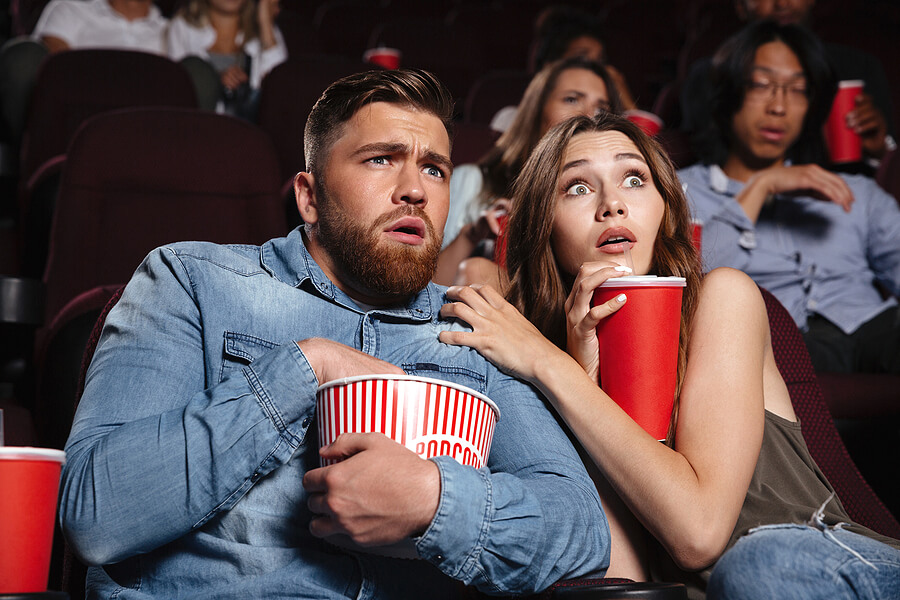
- How Spending Time Outdoors Enhances Hearing Health - July 16, 2024
- Exploring the Impact of Sports on Hearing Health - July 3, 2024
- The Impact of Diet on Hearing Loss - June 28, 2024
Movies have evolved over the years, offering immersive experiences with stunning visuals and powerful soundtracks. While this enhances the overall cinematic experience, it also raises concerns about the potential impact on hearing health. The loud and dynamic audio in modern movies, especially in theaters, poses a silent risk that often goes unnoticed until it affects our ability to hear. Let’s explore how movies may pose a hearing risk and what you can do to protect your auditory well-being.
The Rise of Cinematic Sound
In the early days of cinema, silent films dominated the industry. However, in the late 1920s movies underwent a revolutionary transformation. The integration of synchronized soundtracks added a new layer of storytelling, bringing films to life in ways previously unimaginable. Over the decades, advancements in audio technology have led to the creation of immersive surround sound systems, elevating the cinematic experience to new heights.
High Decibel Levels
The impact of movies on hearing health is closely tied to the intensity of the sound, measured in decibels (dB). The human ear can comfortably handle sounds up to around 85 dB without significant risk of damage. However, many movie theaters and home entertainment systems often exceed this threshold, reaching levels as high as 100 dB or more during intense action sequences or explosive moments.
Prolonged exposure to high-decibel sounds can lead to noise-induced hearing loss (NIHL), a condition that affects millions worldwide. NIHL occurs when the delicate hair cells in the inner ear are damaged due to exposure to loud noises. While the immediate effects may not be noticeable, the cumulative impact over time can result in permanent hearing damage.
The Impact on Hearing Health
A common effect of exposure to loud movie soundtracks is a temporary threshold shift. After leaving a theater or finishing a movie marathon, you might experience a temporary dullness or muffled sensation in your hearing. This is a sign that your ears need time to recover from the intense audio assault.
Prolonged exposure to high-decibel sounds can lead to permanent hearing damage. This can manifest as difficulty hearing soft sounds, ringing in the ears (tinnitus), or a general decline in overall hearing acuity.
The prevalence of loud explosions, gunfire, or screeching tires in movies can contribute to the development or exacerbation of tinnitus. This persistent ringing or buzzing in the ears can be a sign of underlying hearing damage.
Protecting Your Hearing While Enjoying Movies
Here are a few ways you can protect your hearing in the theatre and at home:
Use Ear Protection: Consider using earplugs designed for musicians or high-fidelity situations when watching movies in theaters or using surround sound systems at home. These earplugs reduce overall volume while preserving sound clarity.
Adjust Volume Settings: When watching movies at home, be mindful of volume settings. Avoid turning up the volume excessively, especially during intense scenes. Most modern TVs and sound systems provide options for volume normalization, limiting sudden spikes in audio.
Take Listening Breaks: Give your ears time to recover during extended movie marathons. Take breaks between films to step away from the continuous audio stimulation, allowing your ears to reset.
Choose Theaters Wisely: Opt for movie theaters that prioritize comfortable sound levels. Some theaters have adopted hearing-friendly policies, ensuring a more enjoyable experience without sacrificing audio quality.
Regular Hearing Check-ups: Schedule regular hearing check-ups, especially if you are a frequent moviegoer or enjoy cinematic experiences at home. Early detection of hearing issues can lead to effective intervention and prevention of further damage.
Invest in Quality Headphones: If you prefer watching movies at home, invest in high-quality headphones that provide a clear and immersive audio experience without the need for excessive volume.
Educate Others: Spread awareness about the potential risks of loud movie audio and encourage responsible listening habits among friends and family. Create an environment that prioritizes hearing health without compromising the enjoyment of movies.
Take The Next Step for Your Hearing Health
Movies have the power to transport us to different worlds and evoke a wide range of emotions. However, this magic should not come at the cost of our hearing health. By being aware of the potential risks and adopting protective measures, we can continue to enjoy cinematic experiences while safeguarding our precious sense of hearing.
It’s time to prioritize the well-being of our ears. Visit us today to learn more.
